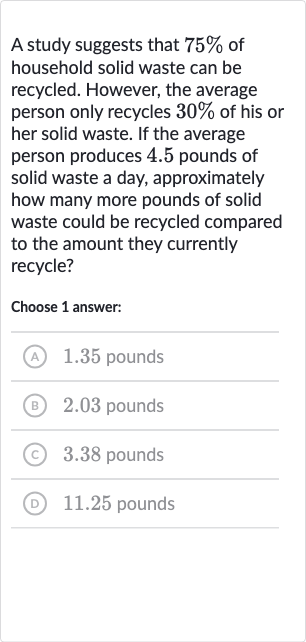AI tutor
Welcome to Bytelearn!
Let’s check out your problem:

A study suggests that of household solid waste can be recycled. However, the average person only recycles of his or her solid waste. If the average person produces . pounds of solid waste a day, approximately how many more pounds of solid waste could be recycled compared to the amount they currently recycle?Choose answer:(A) . pounds(B) . pounds(C) . pounds(D) pounds
Full solution
Q. A study suggests that of household solid waste can be recycled. However, the average person only recycles of his or her solid waste. If the average person produces . pounds of solid waste a day, approximately how many more pounds of solid waste could be recycled compared to the amount they currently recycle?Choose answer:(A) . pounds(B) . pounds(C) . pounds(D) pounds
- Determine recycling potential: Determine the amount of solid waste that can be recycled according to the study.The study suggests that of household solid waste can be recycled. To find out how many pounds that is, we need to calculate of the average person's daily solid waste production.Calculation: pounds = pounds
- Calculate potential recycling amount: Determine the amount of solid waste the average person currently recycles.The average person recycles of their solid waste. To find out how many pounds that is, we need to calculate of the average person's daily solid waste production.Calculation: pounds = pounds
- Determine current recycling amount: Calculate the difference between the potential and current recycling amounts.To find out how many more pounds could be recycled, we subtract the amount currently recycled from the amount that could be recycled according to the study.Calculation: Since we are looking for an approximate value and the options are given to two decimal places, we can round this to .
More problems from Interpret parts of quadratic expressions: word problems
QuestionGet tutor help
QuestionGet tutor help
QuestionGet tutor help
QuestionGet tutor help
QuestionGet tutor help
QuestionGet tutor help
QuestionGet tutor help
QuestionGet tutor help
